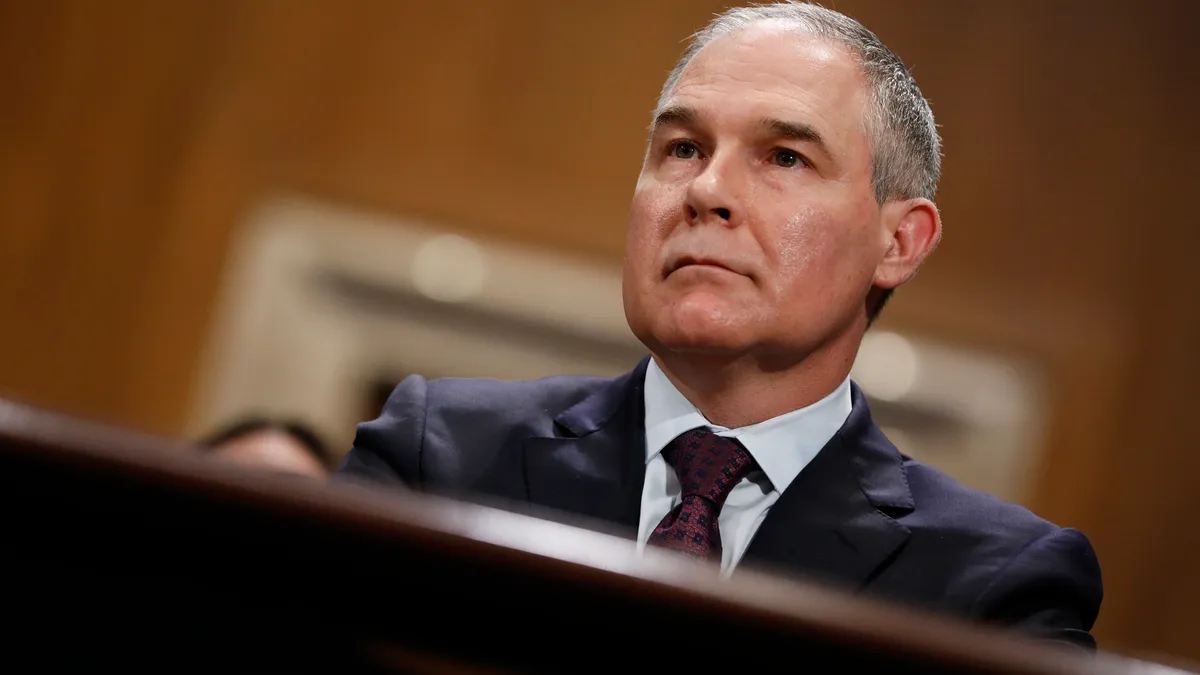Dive Brief:
- The Environmental Protection Agency will pursue a "comprehensive rule" to alter New Source Review regulations under the Clean Air Act, Administrator Scott Pruitt told House lawmakers Thursday.
- Changes to the NSR rules have so far been done through policy memos loosening restrictions for polluters, but an EPA spokesperson confirmed the agency's goal is to eventually include all "improvements" in formal agency rules.
- The announcement came during contentious hearings on Capitol Hill dominated by questions over Pruitt's multiple ethical scandals. Lawmakers also questioned the administrator on a proposed rule to limit the types of scientific studies used to underpin EPA rules.
Dive Insight:
If Pruitt survives investigation into possible ethics violations, the power sector can expect more action on NSR and science policy.
In recent months, EPA has taken steps to alter the agency's interpretation of NSR, a rule under the Clean Air Act that governs emissions from new and modified sources.
In December, EPA ended a "second guessing" policy that allowed it to evaluate companies' estimates of emissions increases. And in January, it axed the provision "once in, always in" that made major pollution sources subject to tougher emission control standards.
Those changes came through policy memos, which a future EPA administrator could rewrite with the stroke of a pen. But Pruitt said Thursday his agency will move to codify those changes in the formal rulemaking process, a lengthier endeavor that involves public comment and is more difficult to overturn.
"Overall we're looking at a comprehensive rule that will address NSR in order to provide certainty and clarity to those across the country that as they make investments to improve outcomes as far as emissions, they're not going to face new permitting requirements under the Clean Air Act," Pruitt told the House Energy and Commerce Committee.
EPA says the "once in, always in" provision discouraged plants and factories from making upgrades to their generators because that could qualify as a "major modification" under NSR, making them perpetually subject to tougher standards.
Critics say that EPA's changes to "once in, always in" and "second guessing" will allow plants to escape NSR provisions when they make upgrades to boost output.
"[Once in, always in] ensured polluters continued to clean up their act and didn't backslide on our guidance," said Rep. Debbie Dingell (D-MI). "You published a huge giant loophole allowing sources to increase their toxic air pollutants with no consequences."
Repealing "once in, always in" may be easier said than done. In the George H.W. Bush administration, the EPA tried to revoke the provision in a formal rule, but was blocked by Congress after leaked memos showed regional EPA staff were critical of the idea.
The potential health impacts of such a rule change are likely to be central to the debate, as EPA pollution rules are based on human health indicators. But during the hearing, Pruitt could not say whether EPA had considered health consequences before it ended "once in, always in."
"That's something we'll have to assess and provide," he said.
Changes to the EPA's science policy could make it easier for Pruitt to push through reforms to NSR and other pollution regulations. On Tuesday, the administrator announced EPA would only consider scientific studies in its rulemaking process that disclose all of their methods and data, a move that he says will improve transparency.
"Seems to me that it's common sense that when we make a rule at [the] agency, [we] base it on a record in which you can see the data," Pruitt told lawmakers.
But critics of the move say the change intentionally excludes human health studies that underpin a number of landmark EPA regulations and gives Pruitt the final say over which studies are considered.
"The type of studies you want to exclude are the same kind of scientific studies that lead in pipe and paints harm children and that secondhand smoke is a dangerous carcinogen," Rep. Raul Ruiz (D-CA) said at the hearing. "We're talking about landmark studies such as the Harvard School of Public Health's Six Cities Study that proved a connection between air pollution and early death back in 1993."
The Harvard study later became the "foundation of fine particulate matter pollution regulations under the Clean Air Act," Ruiz noted — regulations Pruitt has said he supports.
Individual health information in such studies must be kept confidential to meet medical ethics requirements, and requiring all data to be made public could prevent the consideration of some studies, particularly ones with small sample sizes focused on the localized impact of pollutants.
Some conservatives view these studies as “junk science” because they are based on anonymous human health data. Lobbyists for the tobacco industry attempted to bar such studies on secondhand smoke from consideration in the 1990s, The New Republic notes, and some of the same lobbyists pushed for the rule change at EPA.
Court challenges are likely to come against the new science proposal and the NSR changes, before they are codified in a formal rule. Last month, environmental groups petitioned the D.C. Circuit to review the EPA memo on "once in, always in."













